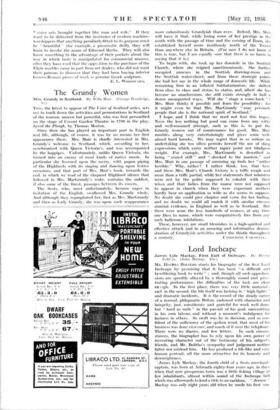The Grundy Women
Tins, the latest to appear of The Voice of Scotland series, sets out to track down the activities and permutations in Scotland of the woman, unseen but powerful, who was first personified on the stage of Covent Garden Theatre in 1798 in the play, Speed the Plough, by Thomas Morton.
Since then she has played an important part in English real life, although, of course, it was by no means her first appearance there. Mrs. Muir is chiefly interested in Mrs. Grundy's welcome to Scotland, which, according to her, synchronised with Queen Victoria's, and was accompanied by the bagpipes. Unfortunately, unlike Queen Victoria, she turned into an enemy of most kinds of native music. In particular she frowned upon the merry, wild, pagan piping of the Highlands with its singing and dancing upon festive occasions, and that part of Mrs. Muir's book, towards the end, in which we read of the eloquent Highland silence that followed in Mrs. MaeGrundy's wake, contains the saddest, if also some of the finest, passages between its covers.
The Scots, who, most unfortunately, became eager in imitation of the English, swallowed Mrs. Grundy whole, And although they regurgitated her, first as Mrs. MacGrundy and then as Lady Grundy, she was upon each reappearance
more calamitously Grundyish than ever. Indeed, Mrs. Muir will have it that, while lOsing Some of her prestige in the South with the passage of time and the coming of Ibsen, she established herself more insidiously north -of the Tweed than anywhere else in Britain. (I'm sure I do not know if this is true, but I am equally sure that there is no harm in saying that it is.) To begin with, she took up her domicile in the Scottish Church, where she reigned sanctimoniously. She further occupied annexes in the Scottish drawing-room and the Scottish water-closet, and from these strategic points she had her say in the whole range of domestic life. While remaining firm in an inflated Sabbatarianism, she shifted from class to class and status to status, and, albeit she has become an anachronism, she still exists strongly in half a dozen unsuspected ways. Will she " stage a come-back " Mrs. Muir thinks it possible and fears the possibility for it might even be that Mrs. MacGrundy " may persuade people that she is the national spirit of Scotland."
I hope, and I think that we need not fear this bogey. None the less nothing but good can come from any witty and well-reasoned attempt, such as this is, to put the Grundy women out of countenance for good. Mrs. Muir rumbles along very entertainingly and gives some well- aimed hard knocks. We may regret that in so serious an undertaking she too often permits herself the use of slang expressions which carry neither rapier point nor bludgeon weight. For example, Mrs. MacGrundy is described as being " seared stiff " and " shocked to the marrow," and Mrs.. Muir in one passage of summing up finds her "rather terrible." Why, rather? I rather think, too, that here and there Mrs. Muir's Church history is a trifle rough and more than a trifle partial, while her statements that ministers were not by the polite 'supposed to 'cohabit with their wives and that ladies from the manse were not supposed to appear in church when they were expectant motheri hardly bear an application so wide as she seems to suppose. No doubt she could give' chapter and verse for her finding, and no doubt we could all match it with similar eircum,. stantial evidence, in England as well as in Scotland. But there were none the less hundreds of manses, at any time one likes to name, which were comparatively free from any
such ludicrous inhibitions. .
These, however, are small blemishes in a high-spirited and effective attaCk'and' in an amusing and infOrmative demon- stration of Grundyish activities under the thistle throughout


















































 Previous page
Previous page